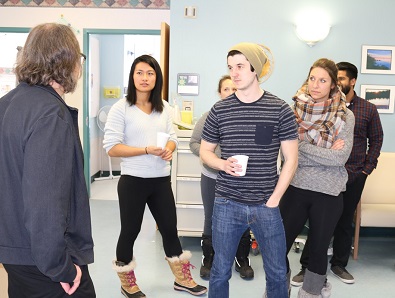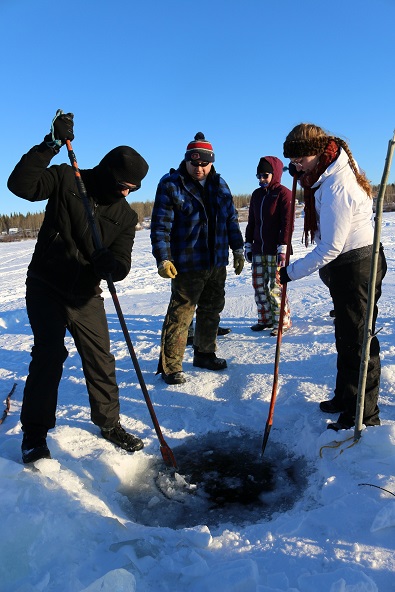U of S medical students try their hand at ice fishing on Lac La Loche during an SMA Roadmap program tour on Saturday. Photo courtesy SMA.
More than a dozen medical students and family medicine residents at the University of Saskatchewan are back from a whirlwind trip to La Loche.
The students are part of a Sask. Medical Association program that takes medical students and residents to tour hospitals and communities in rural Saskatchewan. In November they visited Meadow Lake, and on the weekend they visited La Loche.
The takeoff from Saskatoon was delayed due to weather, but med student and SMA representative Kara Jodouin said they still managed to fit in a tour of La Loche, Clearwater River Dene Nation’s health facilities, and the high school. They also went ice fishing, snowmobiling, and had a feast with some of the community’s Elders.
First-year student Caitlyn Davidson is originally from Flin Flon and felt right at home on a snowmobile, but pointed out some of her classmates never experienced that before “and thought that was the coolest thing they’d ever done, just being able to rip down the lake.”
She said La Loche community members did a good job making the students feel welcome, and a friend who’s studying from out-of-province is now considering working in La Loche or another northern rural location.
One of the big draws of practicing in locations like La Loche is the level of experience you gain in a short time.
“You get to have so much more hands on, you really rely on your clinical skills which it’s really different from an urban centre,” Davidson said.

Thierry Sereau, director of acute care and clinical services for the La Loche Health Centre, gives a tour for medical students during an SMA Roadmap program tour on Saturday. Photo courtesy SMA.
Jodouin said the healthcare staff they met told them their biggest challenges is staffing positions ranging from doctors to lab staff.
The students saw first-hand that La Loche doctors make due with less technology, like lab capabilities and imaging, “which is really beneficial and highly relied on in urban centres for diagnostics. What the physicians were saying is that it’s more of a challenge not having those and it takes more of a clinical judgment and clinical expertise to be able to make the right diagnoses,” Jodouin said.
Davidson is a first-year medical student whose dad is a pharmacist. She said Flin Flon’s shortage of doctors inspired her to get into the medical profession, and now her fellow students are learning the benefits of practicing in areas like her home community.
“Having them see these places and meet some people and see what the people do for recreation beyond what they do within the hospitals” gives people a push to consider practicing in rural and remote communities, she said.
